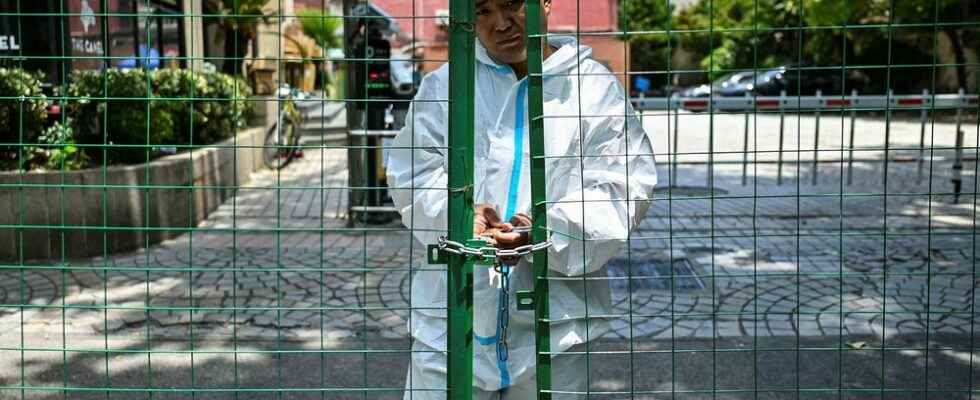One week ago, Shanghai-corkers lightened up on champagne and took to the streets and squares to celebrate that, after two months in isolation, they were finally allowed to go out into the open. They visited beauty salons, ordered their favorite dishes at a restaurant and went to the office.
But the joy was short-lived. On Friday, authorities ordered residents of almost all of Shanghai to test themselves and to stay at home until the results of the mass testing are complete. How long they will be detained again is unclear. It can be a few days, or weeks.
Nobody knows and the Shanghai people are worried. In the face of what became a two-month shutdown, the authorities had said it would be four days.
Worried about one new long period of isolation, people flocked to grocery stores on Friday to stock up on food. During the previous closure, food deliveries were a problem and people complained of hunger. The criticism of the Shanghai authorities was unusually strong. In addition to dissatisfaction with the lack of food, outraged people questioned a policy that separated children from their parents if one of them was infected and which led to patients with other illnesses not receiving the necessary care.
Therefore, the latest news is a severe blow to the people of Shanghai. “When will this end? I just want a normal life “, writes a resident of Weibo, China’s equivalent of twitter.
The same question arises most in China, both people and companies hard hit. No one knows the answer. But no end to the hard covid policy can be seen at present. China’s leader Xi Jinping shows no tendency to give in to China’s zero tolerance, a policy he has personally put his stamp on.
“Perseverance is victory,” Xi Jinping said during a trip to Sichuan province, urging everyone to stand behind zero tolerance.
China’s tough policies were successful as long as it was the delta variant of covid-19. Through surveillance and massive efforts to detect the virus, mass tests and isolation of all patients, they managed to push back the virus. But fast-spreading omicrons have proven harder to eliminate. From an international perspective, there are still few cases in China and most have mild symptoms. But the regime fears catastrophic consequences if the spread becomes widespread. The vaccination rate among China’s elderly is low and the country lacks enough intensive care units to cope with an onslaught of patients.
The strategy now is that everyone who tests positive, whether they have symptoms or not, is sent to a quarantine center of varying quality. Even those who have been in the vicinity of a case are forced to go there. It may be enough to have lived in the house next to someone who is infected.
In Shanghai has now Green fences were erected in some areas to prevent people from going out. Restrictions are also being tightened in Beijing. In the Chaoyang district, home to more than 3 million people, entertainment venues such as karaoke bars and nightclubs are forced to clap again after a few cases. In addition, several cities in northern China have been closed for some time.
It is an expensive policy that requires large resources and that reduces the economy. Sudden production stoppages disrupt supply chains and trade suffers. Consumers are more cautious and investors are turning a deaf ear. Forecasters now doubt that China will reach its growth target of 5.5 percent this year.
But Xi Jinping, who is believed to be re-elected leader at this autumn’s party congress, seems to be taking that cost rather than losing face and saying his strategy is wrong.
A sign that the policy is here to stay is that the authorities have been instructed to build several permanent quarantine centers and test stations. A resident should never have to walk for more than 15 minutes to get tested and cities with over ten million inhabitants are encouraged to have at least 1,500 hospital beds ready for those who test positive in addition to temporary quarantine centers.
Read more: Torbjörn Petersson: It can go so bad when a single man decides in China
Facts. Monitoring through health apps
China’s covid policy is to shut down cities or areas as soon as a single case is discovered. Monitoring through, among other things, health apps is used to track the infection. Mass tests are performed regularly.
Since the outbreak, China has also largely closed the border for arrivals from abroad. Those admitted must undergo strict quarantine at hotels or in specially selected quarantine centers.
To date, 885,000 have been infected and 5,226 people have died in covid-19 in mainland China, according to Our world in data.
Show more
